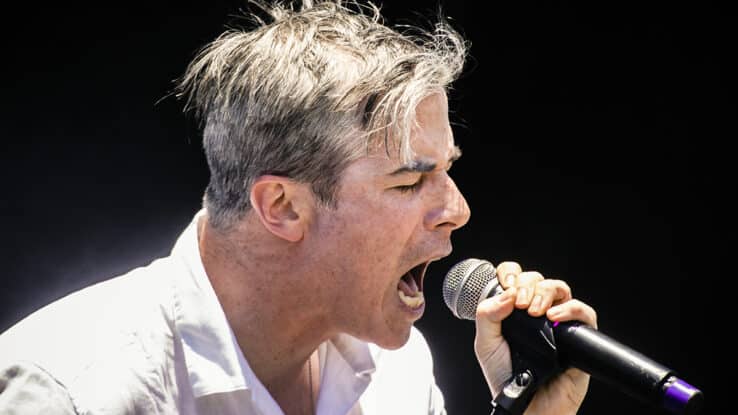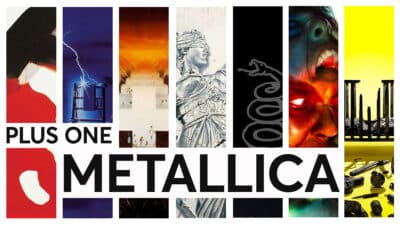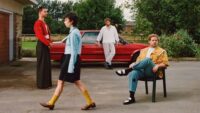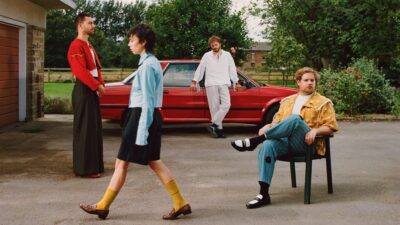Interview

Interview
Fiddlehead: “I’ll never get over grief, but I think I’ve kinda learned that that’s okay.”
Fiddlehead’s Pat Flynn talks coming out the other side of sadness, and how the music helped him do it
The first time Fiddlehead’s Pat Flynn remembers ever connecting with a piece of music, he was seven years old and a classmate of his, Erica, had just lost her mother. He was sitting in the car about to head into school, and there was music playing on the radio (he doesn’t remember which song; he’s been searching for it ever since), when he saw Erica walk by. “There was something about the music that helped me see that her mother wasn’t there, and to kinda see the greyness and the sombreness of the day,” he recalls. “And if I’m thinking very carefully, I think that was a moment of developing a musical consciousness, and [awareness of] the power of music to help you engage with the world and live in it with other people.”
It’s clear that ever since, Flynn – a 38-year-old from Massachusetts who is a history teacher by day – has been led musically by the same instinct. He formed the hardcore punk band Have Heart in his teens, with which he eschewed the typical antagonism of the genre, instead delving deep into the weight of family trauma and his own hard-won introspection. They went on to become arguably the most legendary hardcore band of their era by the time they disbanded in 2009 (they played a series of reunion shows in 2019 which, by attendance, were some of the largest hardcore shows ever).
In 2014, he formed the more melodic – though still plenty biting – Fiddlehead. Their debut album, 2018’s Springtime & Blind, was a vehicle for Flynn to process the grief from the death of his father in 2010. 2021’s Between The Richness saw him expand on those themes after the birth of his own son, reflecting on the intersection of the deepest grief and the deepest joy (he now has a daughter too). Their most recent album, 2023’s Death Is Nothing To Us, rounds out this trilogy, as Flynn navigates the act of finding purpose and resolve in the midst of unrelenting heaviness.
You only have to go to one of Fiddlehead’s live shows to see how deeply their combination of punk fire and life-affirming lyricism resonates with fans. With a UK tour through February about to begin, Flynn speaks about what he’s learned about grief and why Fiddlehead has been such an important conduit for it.
Could you talk me through the making of Death Is Nothing To Us?
We wrote a lot of it in the pandemic. We had actually just finished our second record which wasn’t even out yet. The band has really been more of a vehicle for the friendship between us – like a reminder to get together and do stuff, beyond just seeing a movie or something. It cultivates a really special atmosphere when the five of us are together. And we were just slinging out riffs and having a good time doing it. We were kinda surprised by the success of our second LP, which was a little bit brighter, a little bit more melodic, because we hadn’t really explored that and we wanted to. But the five of us all come from a fairly aggressive musical background, so I think we wanted to fuse a little more of that in, in terms of the musicality. I think lyrically on my end, it’s rounding out the stages of grief, which is kind of how and why the band started. And very gratefully I found myself coming to some point of catharsis in my own life, where the memories of my losses have stopped haunting me and paralysing me to the point that they were when my father first passed.
The last three albums have been a trilogy in which you navigate and wrestle with the experience of grief. What do you think that writing these albums has shown you?
That’s a good question. I don’t know if I have a good answer for that. I hate advice, I never want to give it. It always sucks. Which tends to be why I write the way that I do. I think for me it’s just like… I don’t like the idea of loss destroying me, at all. Partly because when you get destroyed by a tragedy, it becomes so easy to just kind of swim in it. It’s very comfortable. You get what feels nice in the short term, like the sympathy and empathy of others. Then there’s this alienating feeling of like, have I used up all my time to grieve publicly?
I’m somewhere in this place of like, when my mother passes, I will be rocked. But I feel confident in the point that I will not have my life destroyed, to the point where I cannot even remember the reality that death is a part of life, and that I’ve had this unbelievable experience and journey in life with her. And I think having the opportunity, the privilege really, to write so openly about the stages of grief, have helped me arrive at that point. It’s really only by way of these four gentlemen that I play music with that has given me the score for that.
But yeah, I think it might be difficult, genuinely, for me to write about it anymore. Because I tend to only want to write about the things I really don’t understand. So yeah, I’ll never fully understand it, but I really didn’t understand it before.
Your second album, Between The Richness, explored the feeling of becoming a father after having lost your own father. What perspective did that give you?
It was an alienating experience. I don’t think I’ll ever really get over that, ever, knowing that my father will never get to meet my son or my daughter. It’s just a lingering sting. But you know, there are ways in which you bring people to life – through music and song and talking about it in interviews. I never really got to meet my father’s father, but I did get to see my father talk about him. And that taught me what it means to love the people that are no longer around. We talk about [Flynn’s father] all the time. And my kids will always hear about him. And they will eventually read the records that I wrote and try and make sense of what I was going through, and I think that that’s a nice way of trying to connect with your own parent. So I’ll never get over it, but I think I’ve kinda learned that that’s okay. What do you do in the meantime, until you die? You talk and write and tell stories.
How does it make you feel to know that fans connect so deeply with the songs you write about these experiences? Does that come with any kind of pressure?
I’m glad it can connect with people. You put it out into the world and hope it has a positive impact in some way, shape or form. But I feel zero responsibility for anybody. I think what I really try and reinforce to people, if they ever have a kind thing to say, is to remind them that if you’ve had any positive incline in your life ultimately it’s because you made the decisions that got you there. You decided to put my record on and listen to it; you decided to actually listen to the lyrics and connect with the music and feel something. Ultimately that is all your decision-making. I’m a soundtrack. In the same way I come back full circle to how, ultimately, I decided to see Erica walking without her mother. I could have just said, ‘I don’t really care, I’m seven years old.’ But I decided to try and effectively empathise with another human being. And I’m proud of that moment, that I can still talk about 31 years later. I hope my children have that capacity too. Because it’s easy, so easy, to just not give a sh*t. You have to make those decisions, and I really try and highlight and emphasise the individual agency that we all have.
You guys are coming over for a UK tour soon. What has the UK meant to you over the years?
With Have Heart, it was always great. Our friends in the band Down To Nothing had been to the UK and said it’s the best place to play across the Atlantic. And they’re right. Our first show was in Birmingham, and all I knew was that Black Sabbath was from there and it was this old industrial town. And sure enough we got this feverish response. So we always looked forward to playing there.
With Fiddlehead, [guitarist] Alex Henery is from England, so we have close ties there. We’re just so excited to go back. There’s a kindness, there’s a thoughtfulness, there’s a history of music that I just find so inspiring. There’s a history of politics and philosophy that I find also very inspiring. I think it’s definitely been kind of a second home for us. We’ve always been super grateful to play there. It really is a gift. I oftentimes find myself concerned that the people we get to play to might not fully understand just how happy and grateful we are to have anybody sing along. Especially three records in, it’s like, wow, what a gift. We’ve been super lucky in that sense.
Fiddlehead play UK dates in 2024 between 18-24 February. Find tickets here.
Photo credit: Greg Doherty/Getty Images









